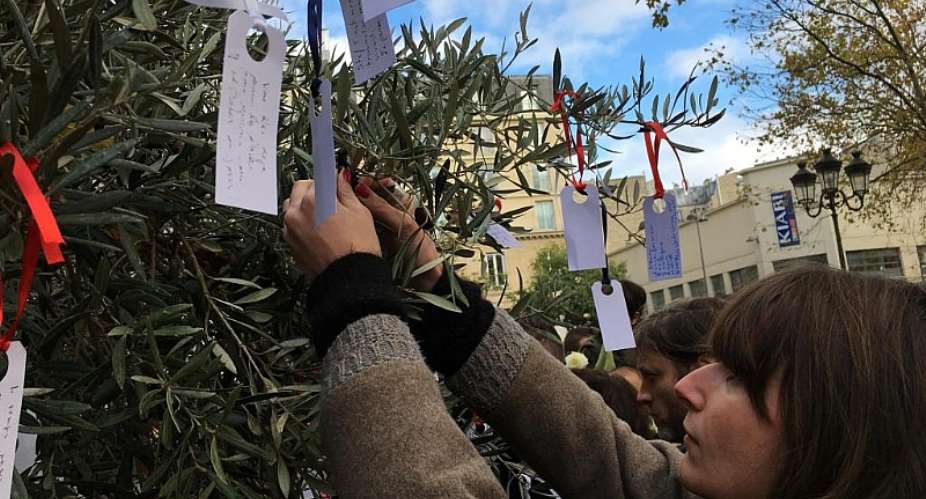Several hundred people gathered in Paris on Wednesday to pay tribute to the 130 people killed in terror attacks on 13 November 2015. For those affected by the massacre at the Bataclan concert hall, the anniversary stirs a mix of powerful feelings.
Survivors and family members of victims gathered for an official ceremony in front of the Bataclan concert hall, one of several targets of attacks around the French capital on 13 November 2015.
Police officers, firefighters and paramedics were also in attendance for a fourth-anniversary ceremony marked by a reading of the 90 people who died, a moment of silence and a laying of wreaths.
“It's easier from one year to the next,” said Laurent Moreau, a 44-year-old graphic designer. “The hardest part is seeing families crying and hearing the reading of the names.”
Violence remains fresh
Moreau was at the concert with his wife and two friends. Although all survived, he came to the ceremony alone.
“The others don't want to come, it's too hard for them,” he said. “My wife and I moved away from Paris. One friend lost his job, because it was impossible for him to work, to clear his mind. And the other closed it off, he doesn't want to speak about the Bataclan.”
Even if four years have passed, the events remain very much a daily reality for those who were confronted with the extreme violence of the attack.
“I've come four years in a row, and I was really struck by the huge amount of emotion,” said Alexis Lebrun, a Bataclan survivor and spokesperson of Life for Paris, one of the two groups representing victims of the attacks.
“For people who were touched directly on 13 November 2015, it's still fresh in their memory.”
Importance of commemoration
After the ceremony, Life for Paris held another gathering outside the town hall of Paris's 11th arrondissement a short walk away for speeches and musical tributes.
“It took me a long time to be able to come,” said Dany Krivokuca, 54, a Bataclan survivor attending the ceremony for the second time.
“At the beginning you don't want to accept this, and you work on yourself and with people around you, just to say okay, this has to stop, we have to be strong to stop this together.”
Now Krivokuca comes in the spirit of commemoration.
“Some people just want to erase all of this, but I don't think it's a good idea,” she said. “It's like war: you cannot forget war, you have to think about it.”
Others have been coming from the start. Sheelagh Alexander, whose son Nick died in the Bataclan, travels from the UK to attend ceremonies every year.
“The first year it was really new, no one knew what was really required, people were still recovering,” Alexander said. “Now I think it's gotten into a routine and they're seeing what people need.”
Less public attention
Participants also observe that each year's anniversary brings less attention of politicians and media, a problem for victims still coping with the psychological consequences of the attacks.
“Society doesn't really understand the consequences of the attacks, not only for the families of the deceased but also for survivors, whose lives have been permanently affected by what happened,” Lebrun said.
For attendees, the waning attention simply underlines the importance of commemoration.
“There are maybe 20 television cameras,” observed Laurent Moreau at the Bataclan ceremony.
“Last year there were 30, two years ago there were 50, the first year there were 100. I think it's important though, because it's in the past, and we need to move on.”





 Tuesday’s downpour destroys ceiling of Circuit Court '8' in Accra
Tuesday’s downpour destroys ceiling of Circuit Court '8' in Accra
 SOEs shouldn't compromise on ethical standards, accountability – Akufo-Addo
SOEs shouldn't compromise on ethical standards, accountability – Akufo-Addo
 Father of 2-year-old boy attacked by dog appeals for financial support
Father of 2-year-old boy attacked by dog appeals for financial support
 Jubilee House National Security Operative allegedly swindles businessman over sa...
Jubilee House National Security Operative allegedly swindles businessman over sa...
 Nobody can order dumsor timetable except Energy Minister – Osafo-Maafo
Nobody can order dumsor timetable except Energy Minister – Osafo-Maafo
 Mahama wishes National Chief Imam as he clock 105 years today
Mahama wishes National Chief Imam as he clock 105 years today
 J.B.Danquah Adu’s murder trial: Case adjourned to April 29
J.B.Danquah Adu’s murder trial: Case adjourned to April 29
 High Court issues arrest warrant for former MASLOC Boss
High Court issues arrest warrant for former MASLOC Boss
 Align academic curriculum with industry needs — Stanbic Bank Ghana CEO advocates
Align academic curriculum with industry needs — Stanbic Bank Ghana CEO advocates
 Election 2024: We'll declare the results and let Ghanaians know we've won - Manh...
Election 2024: We'll declare the results and let Ghanaians know we've won - Manh...
